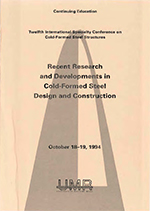Location
Saint Louis, Missouri
Session Dates
18 Oct 1994
Abstract
A test program on purlin-sheeting systems with concealed fasteners has been performed at the University of Sydney in a vacuum test rig. The test rig used a conventional vacuum box to simulate wind uplift. Z-section purlins were tested in three span lapped configurations, and as simple spans. The test purlins were supported by a range of bracing (bridging) members ranging from zero to two braces per span. In addition, a range of section slenderness values was used so as to precipitate both local buckling and yielding failures in the section. The purpose of the paper is to compare the test results with design loads in the Australian Standard AS 1538-1988 based on a flexural-torsional buckling analysis.
Department(s)
Civil, Architectural and Environmental Engineering
Research Center/Lab(s)
Wei-Wen Yu Center for Cold-Formed Steel Structures
Meeting Name
12th International Specialty Conference on Cold-Formed Steel Structures
Publisher
University of Missouri--Rolla
Document Version
Final Version
Rights
© 1994 University of Missouri--Rolla, All rights reserved.
Document Type
Article - Conference proceedings
File Type
text
Language
English
Recommended Citation
Celeban, Michael; Healy, Chris; and Hancock, Gregory J., "Tests of Purlins with Concealed Fixed Sheeting" (1994). CCFSS Proceedings of International Specialty Conference on Cold-Formed Steel Structures (1971 - 2018). 5.
https://scholarsmine.mst.edu/isccss/12iccfss/12iccfss-session8/5
Tests of Purlins with Concealed Fixed Sheeting
Saint Louis, Missouri
A test program on purlin-sheeting systems with concealed fasteners has been performed at the University of Sydney in a vacuum test rig. The test rig used a conventional vacuum box to simulate wind uplift. Z-section purlins were tested in three span lapped configurations, and as simple spans. The test purlins were supported by a range of bracing (bridging) members ranging from zero to two braces per span. In addition, a range of section slenderness values was used so as to precipitate both local buckling and yielding failures in the section. The purpose of the paper is to compare the test results with design loads in the Australian Standard AS 1538-1988 based on a flexural-torsional buckling analysis.



